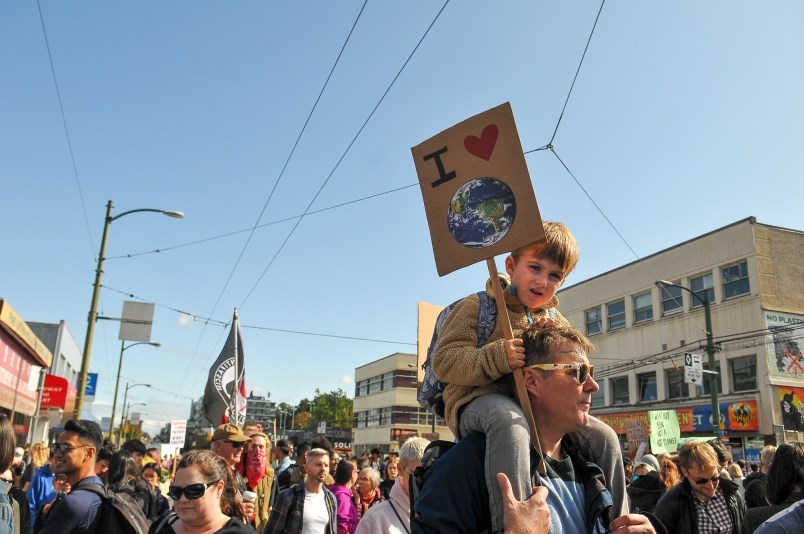The morning after the Liberals re-secured a minority government, a coalition of organizations called on Prime Minister Justin Trudeau to fulfil the party’s pledges to address the climate crisis.
It comes after a campaign in which Canadians, and particularly British Columbians, signalled climate change as a top election issue following a summer of deadly heat and devastating wildfires.
“Thirty-five days ago, Trudeau called an election, believing he would win a majority. But we know that he got a minority government last night, partly because voters were frustrated by his delayed action on climate,” said senior campaign manager at SumOfUs Angus Wong in a written statement.
The coalition, representing several high-profile environmental organizations like Environmental Defence, Climate Action Network Canada and Stand.earth, noted that nearly 60 per cent of the popular vote backed parties with strong climate commitments.
Among those promises was a Liberal plan to increase the price of carbon to $170 per tonne by 2030, a key mechanism to drive emissions down at least 30 per cent below 2005 levels by 2030. The party also pledged to put a cap on emissions from the oil and gas industry — which contributes the largest share of the country’s emissions after the transportation sector — and move to end an estimated $18 billion in fossil fuel subsidies.
Experts say the Liberal plan to address climate change was the most credible of the federal parties. But the coalition of environmental groups said it’s concerned such promises will go unfulfilled.
“Canada is the only G7 country whose emissions have increased since the landmark Paris Agreement was signed. To turn that around, we need ambitious climate action now,” said Liz McDowell, a senior campaign strategist with Stand.earth.
“We’re calling on all party leaders to put their politics aside and work together without delay to protect our communities and our planet.”
Returning to a near spitting-image of the Liberals' minority rule might not be a bad thing to move the climate agenda forward, said Simon Fraser University political scientist Stewart Prest, especially with the NDP once again playing a key, if limited, role in propping up the government.
Despite another fractured Parliament and the rise in popularity of the People’s Party of Canada, a large majority of Canadians are now represented by a collection of parties that tend to agree on some big issues.
“If the country is polarized, the line of demarcation runs through the Conservative Party,” said Prest, pointing to its shift to support safe injection sites and some willingness to engage with labour unions.
“We saw all these areas where the Conservatives were willing to moderate their views.”
Indeed, Conservative Party Leader Erin O’Toole struck a moderate tone in his concession speech Monday night after a campaign that saw the Tories embrace at least some action on climate change.
“Ours is a conservatism that dwells not in the past but learns from it to secure the future,” O'Toole said, signalling he was committed to continue as party leader going forward.
The Conservative Party’s move left comes as it struggles to make headway among increasingly progressive suburban voters.
Gerald Baier, a political scientist at the University of British Columbia, said that’s partly due to a younger cohort of suburban voters driven to the suburbs by a rising cost of living.
“These are very tight ridings in many of these cases,” said Baier. “It does suggest some of the social conservative issues won’t hold. Conversion therapy is not going well in these ridings.”
In many of the in Metro Vancouver, the electorate is split down what Prest describes as a referendum on climate change.
“For the last two electoral cycles, there’s been these strong divisions between the parts of the country defined by resource extraction and those that are focused on climate action,” said Prest.
“It seems to creep up to the edges of the Lower Mainland.”
Following wins in several Metro Vancouver ridings, Liberal MPs said they would work to follow through on such promises.
Liberal Carla Qualtrough, heading back to Ottawa to represent the riding of Delta, said she would work to ban the export of thermal coal out of Deltaport by 2030.
On the campaign trail, Qualtrough, along with Burnaby North-Seymour MP Jonathan Wilkinson, framed the export of U.S. thermal coal through the Canadian port as a “dirty” problem contributing to climate change and affecting the air local children breathe.
How such promises will lead to real action remains an open question.
What is certain, said Prest, “They are going to have to find a place to compromise.”




